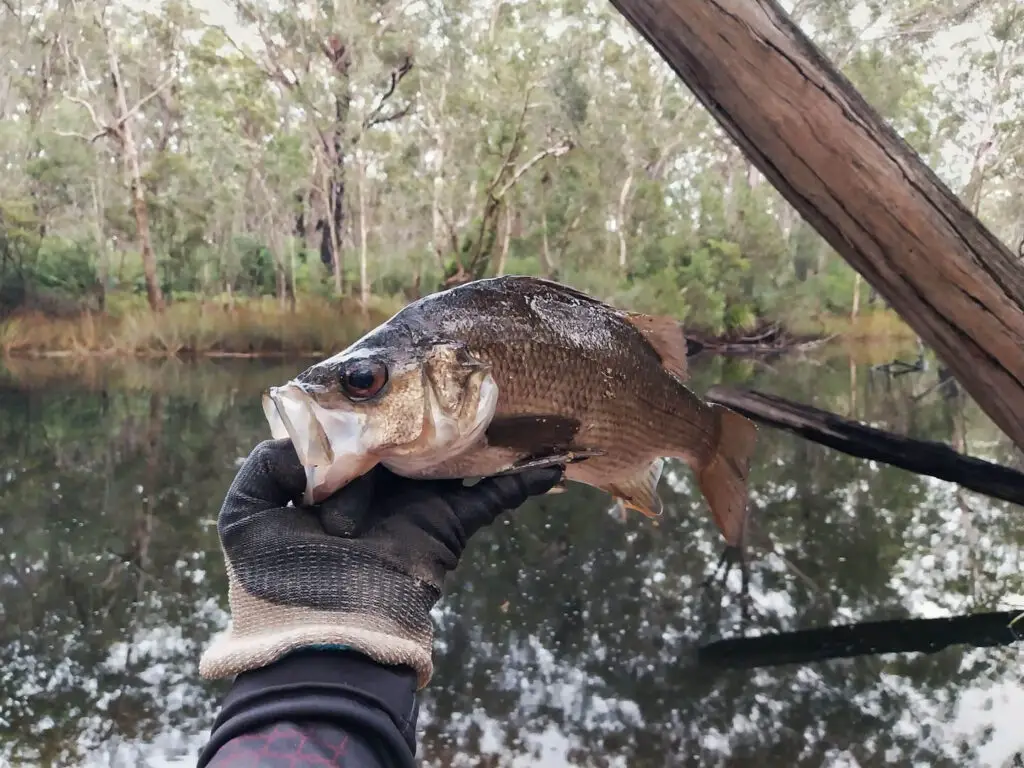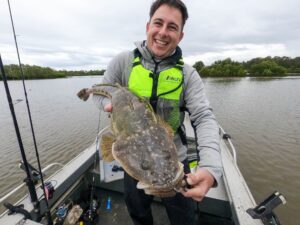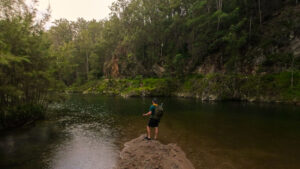Ever since my first overnight fish hike chasing Aussie Bass a few years ago in the Bellinger River, I’ve been dying to get back to the same sort of wild, remote river systems for more.
When searching for the next system to try, it was really hard to go past my home territory in the Clarence River in Northern NSW.
So I did some research and decided to try a lesser known section of the Clarence River catchment closer to the coast – the Esk River.
Nestled amongst Bundjalung National Park north of Iluka, this is the largest untouched coastal river system in Northern NSW.
The Esk begins in the swamps around Tabbimobile, and winds its way south through marshes and native forest along steep river banks before meeting the North Arm of the Clarence River between Iluka and Woombah.
The northern most sections are freshwater that were reported by fellow locals to hold resident populations of Australian Bass.
The river also flows down through brackish and into saltwater for exceptional flathead and bream fishing in the lower sections.
The plan for this trip was to hike in from the top end, with the nearest access point located in Black Rocks Campground. I parked my car at the campground and began the 6km trail hike to spend the night on the river banks for some good fishing.
When hiking and camping in remote sections of National Parks, it’s best to check the plan of management to check for restrictions or protected areas.
In this park, much of the surrounding sections either side of the Esk River are designated primitive or wilderness areas, so self reliant camping and bushwalking is allowed as long as you manage your impacts and leave no trace.
Once I got through to the river bank, I set up a tarp camp for shelter and started fishing as a thunderstorm rolled through.
I didn’t have any luck the first night due to overly careful casting and not wanting to lose gear to snags in the dark.
But the next morning was completely different.
BAM! First cast on the cicada surface lure and I pulled in the first fish, a lovely small Australian Bass. My heart was pumping already.
The river was lightly swollen from the night of rain, it was overcast but humid, and I was getting hits and boils on almost every cast from first light until late morning.
I was able to test a few modified surface lure retrieves which were extremely effective.
One method with the cicada surface lure was to use a very slow wobble and twitch action — just enough to roll the wings into the water 2-3 times without moving the lure too far along. A light flicker and turn and then let it sit for five seconds and it was nailed.
On the 58mm Bassday Sugapen I let the initial cast ripples roll away before the usual walk the dog retrieve for a few winds. After this it was a good pause followed by a double walk, pause, repeat. The EPs were hitting this so hard the lure would be launched clear out of the water 2-3 feet in the air and then smashed again when it hit the surface. Incredible fishing!
I ended up catching several small bass, and a few larger Esturary Perch which made it onto the measuring mat.
Really enjoyed catching most of these fish on the ultralight Daiwa Presso 6′ 0.5-3kg rod which breaks into two and is still small enough to slide into the side of my pack.
The killer Tonic Eyewear sunglasses make surface and shallow water fishing great on the eyes, and I’ve been using the photochromatic copper lenses which lighten or darken as I hike under and out of canopy so I’m not taking them on and off constantly.
I spent another 2 hours hiking further upstream to try and access another river bend to try my luck but was unable to find somewhere to cast over the steep banks and reeds.
After returning back to camp the water levels had dropped and the sun was burning through the clouds and as a result the bite fell off towards the middle of the day.
So after camp pack up and some lunch I hit the trail back to the car with a huge smile and ready for the next remote fsihing trip.
It’s amazing what’s around in our local systems when you take the time to explore. Go find some wild lines and enjoy!



